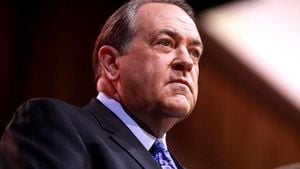Former Vice President Mike Pence is leading the charge against President-elect Donald Trump’s decision to nominate Robert F. Kennedy Jr. as the head of the Department of Health and Human Services (HHS). Pence's criticism, which touches on abortion rights, highlights the brewing tension within the Republican Party as it navigates the complex waters of personal beliefs and party platform.
Pence's announcement came on Friday, where he urged Senate Republicans to reject Kennedy’s nomination, citing Kennedy’s past support for abortion access as contrary to the pro-life ethos long championed by the party. “I believe the nomination of RFK Jr. to serve as Secretary of HHS is an abrupt departure from the pro-life record of our administration,” Pence stated unequivocally. He added, “This should be deeply concerning to millions of Pro-Life Americans who have supported the Republican Party and our nominees for decades.”
The former vice president's remarks are not just rhetoric; they represent the nuanced and often fractious discussions happening within Republican ranks, particularly as the party inches closer to the 2024 election. The public perception of Trump and GOP choices are being closely monitored following the January 6 Capitol attack, events leading to Pence's distancing from Trump, and Trump’s descent from grace with parts of the conservative base.
Pence’s critique of Kennedy isn’t merely tactical; it digs deep to examine Kennedy's historical views on reproductive rights. According to Pence, Kennedy has previously defended the notion of “abortion on demand during all nine months of pregnancy” and expressed intentions to overturn the Dobbs decision, which rolled back federal protections enshrined by Roe v. Wade. “If confirmed, RFK, Jr. would be the most pro-abortion Republican appointed secretary of HHS in modern history,” Pence declared, emphasizing the severity of what he sees as political missteps.
What’s particularly noteworthy here is the unlikely alliance developing between Pence and reproductive rights advocates. While Pence’s views are typically aligned with anti-abortion sentiments, groups like Reproductive Freedom for All joined with him against Kennedy’s nomination. Mini Timmaraju, president and CEO of the organization, described Kennedy as “an unfit, unqualified extremist who cannot be trusted to protect the health, safety, and reproductive freedom of American families.”
Both camps — the pro-life political wing and those advocating for reproductive freedoms — appear to converge on the idea of Kennedy’s appointment as detrimental. The stakes, as both Pence and others caution, could put long-standing policies and protections at risk as the new administration potentially shifts the regulatory capabilities of HHS, which oversees agencies like the Food and Drug Administration (FDA) and the Centers for Disease Control and Prevention (CDC). A confirmation of Kennedy could embolden changes to health policy seen as limiting or banning abortion services, particularly as he has been associated with controversial beliefs and health policies.
Kennedy himself, preceding the controversy over his nomination, has had his views on abortion shift significantly during various points of his political life. Initially, during his presidential campaign as a Democrat, he suggested support for banning abortion procedures after the first trimester. Subsequently, his position became murky when responding to media inquiries, especially during interviews where he grappled with the specifics of legislation intended to limit abortion access.
Trump’s rhetoric on abortion as the current Republican candidate has also attracted attention. He has campaigned on the premise of leaving abortion legislation to the states, which deviates from the previously hardline views propagated under prior administrations. Yet, many within the party feel betrayed, mirroring Pence's frustrations with Trump’s perceived softening on once core Republican issues like abortion. Pence articulated his concerns, saying, “On behalf of tens of millions of pro-life Americans, I respectfully urge Senate Republicans to reject this nomination and give the American people a leader who will respect the sanctity of life as secretary of Health and Human Services.”
Trump, on the other hand, is steadfastly committed to his nomination of Kennedy, asserting his belief in the necessity of appointing figures who challenge the conventional wisdom of health policy crafted through traditional political filters. This rhetoric has been decried not only by Pence but by other political commentators who echo sentiments of concern over Kennedy’s past associations with conspiracy theories and vaccine skepticism.
The debate surrounding fluoride regulation and his claims linking fluoride to health risks adds another layer of complexity. Kennedy has called for the removal of fluoride from public water supplies, alleging connections to various health concerns — claims strongly contested by leading health bodies like the CDC, which advocates for controlled fluoride levels as beneficial to public health. “There’s no evidence to suggest the levels of fluoride installed today lead to adverse health effects,” said officials from the CDC.
With noise from both sides of the aisle growing, it’s evident the fallout from this nomination is far from settled. Anti-abortion advocates and those championing reproductive rights both recognize the weight of this candidacy and its broader repercussions on HHS, which would be responsible for shaping health policy impacting Americans across the country.
For Pence, this nomination is not just another political stage — it’s about maintaining the integrity of pro-life advocacy within the ranks of Republican ideology as they prepare for the election. Whether or not Senate Republicans will heed his call and reject Kennedy remains uncertain. Still, one thing is clear: The Republican Party is at a pivotal moment, grappling with its identity, managing past allegiances, and facing the ever-evolving nature of its core platforms, most palpably during this contentious nomination period.



